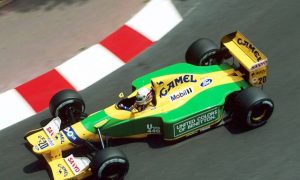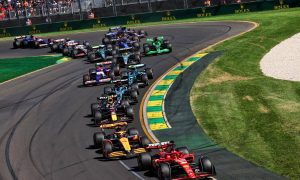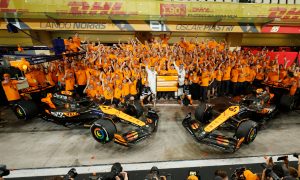Formula One has always been about the pursuit of excellence, about innovation and seeking for any advantage you can find, no matter how big or small.
I confess, this year’s Australian Grand Prix was only my second trip to the opening race of a season in person, but it certainly felt like a weekend when the overriding emotion among fans was one of underwhelming predictability rather than excited anticipation.
I grew up watching F1 from the mid-Nineties and was not a fan of Ferrari’s domination at the start of the 2000s. I never found it boring - the sport captivated me - but I was regularly disappointed having lived in hope when the lights went out and then watched Michael Schumacher (or sometimes Rubens Barrichello) ease away to victory.
But today, do many fans even live in hope that Mercedes can be challenged when waiting for the start of a race? Or do you solely pray for mechanical intervention to open up the potential for a shock result?
Writing race reports during the years of Sebastian Vettel’s dominance I can recall numerous occasions when I stated the disappointment of having to write an all-too-familiar headline when the race itself was hugely entertaining and Red Bull was made to work very hard for victory. That Mark Webber could be beaten to second place highlights both Vettel’s talent and the difference with those years compared to the advantage enjoyed by Mercedes over the past 13 months.
Season over mate, it's Ferrari early 2000s all over again
Speaking to one senior source in the paddock over the Australian Grand Prix weekend, they revealed Mercedes has been massively hiding pace and it was clear Lewis Hamilton and Nico Rosberg were doing so again throughout the race. 30 seconds is far from the true advantage it could have, but displaying its full potential would make calls for change even louder.
After qualifying, they were even moved to say: “Season over mate, it’s Ferrari early 2000s all over again.”
One team always has to win and always has to be the best. There are peaks and troughs in terms of competitiveness for everyone, which are often dictated by changes in personnel or regulation.
But how much is too much? When both those within F1 as well as fans watching are saying “season over” before even the first race, is the cushion enjoyed by one team over the rest of the field so big it needs to be addressed for the good of the sport?
At the start of the 2014 season - a time of year usually reserved for optimism - then-Caterham boss Tony Fernandes admitted he was thinking of exiting F1 to focus on his football venture with Queens Park Rangers due to the predictability of grand prix racing.
"I'm in a fantastic position to see two sports - football and Formula One,” said Fernandes, who got rid of Caterham later in the year. “Every week I go to a [QPR] game nervous as hell, whether we're playing Yeovil, Doncaster or Leicester, because football is unpredictable. It's no secret people are paying more money to watch football, TV rights are growing, global audiences are growing, so what are they doing right that we're not doing right in Formula 1?
"The racing stays the same, with the same three or four teams there winning. There is no underdog who comes in. In football, what's great is a Yeovil going into a cup game and beating a Manchester United. That can happen in football."
The real concern right now lies with the current power unit regulations restricting the ability for rivals to cut the gap. Renault has the most tokens still to use in 2015, but it also seems to be lacking direction and the ability to make clear progress. Ahead of the start of the season, Red Bull’s Christian Horner believed it was likely the Mercedes advantage would be reduced…
“Inevitably I think things will naturally converge, people move around, knowhow of why Mercedes are as quick as they are inevitably will become known,” Horner said in January. “It’s the same on the chassis side. I think it will certainly be interesting to see at the end of this year how much the engine manufacturers have converged on Mercedes or whether Mercedes have in fact have stretched their legs even further.”
With the latter having appeared to have happened thus far, the current regulations are likely to see the Mercedes advantage remain in place for some time to come. While Horner has been vocal recently about the need to equalise performance - citing times Red Bull was targeted to try and reduce its advantage - the difference is there doesn’t seem to be an area where Mercedes is bending the rules. Brackley is just doing everything very, very well.
Rob Smedley hits the nail on the head when talking about the advantage enjoyed by Mercedes, having previously been part of the aforementioned Ferrari team which had a stranglehold on F1 over a decade ago.
“I don’t think it’s bad for the sport at all,” Smedley said. “Formula One is all about levels of excellence. I think that (Mercedes) are now the absolute benchmark, the levels of excellence that they have attained throughout their whole operation is pretty outstanding. And I would take my hats off to them. I’d say they have done an absolutely fantastic job.
“I am not going to sit here and bitch and moan because they’re quicker than us. I have been in situations in teams before where we’d been dominant. And now I am in a team where there is another team that is dominant.
“If you work hard enough and you do everything right, then there are the rewards. (Mercedes) have worked hard enough and they have done everything right. I think it’s good for the sport because it shows how hard everyone is pushing.”
The gap is a huge one, but not an impossible one to close; if Mercedes can find such performance then another team can do similar. Ferrari’s obvious strides over the winter shows what can be achieved, and that comes from a team which has seen a major overhaul of personnel over the past six months.
Should the sport be looking to change? Perhaps, but it shouldn’t be Horner or any participant that is publicly calling for it. Any change should be analysed and suggested by the FIA - the rule makers - if it feels F1 needs protecting. Until then, as Toto Wolff says, the rest should just get their heads down.










